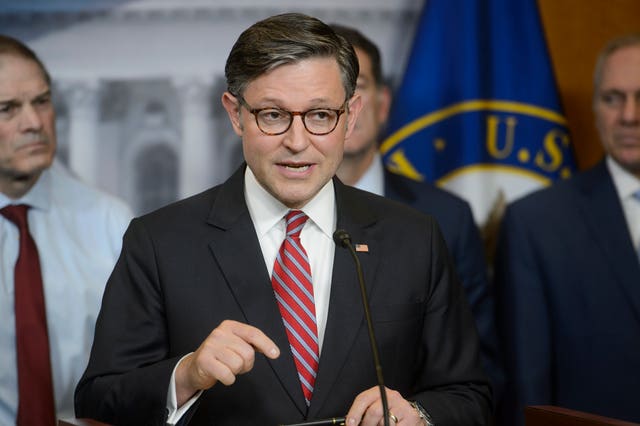House Republicans pass Trump’s big bill of tax breaks after all-night session
The outcome caps an intense time on Capitol Hill, with days of private negotiations and public committee hearings around-the-clock.

House Republicans stayed up all night to pass their multitrillion-dollar tax breaks package, with speaker Mike Johnson defying the sceptics and unifying his ranks to muscle US President Donald Trump’s priority bill to approval.
With last-minute concessions and stark warnings from Mr Trump, the Republican holdouts largely dropped their opposition to salvage the “One Big Beautiful Bill” that is central to the Republican agenda.
The House launched a debate before midnight and by sunrise on Thursday the vote was called, 215-214, with Democrats staunchly opposed.

It next goes to the Senate.
“To put it simply, this bill gets Americans back to winning again,” said Mr Johnson just before the vote.
The outcome caps an intense time on Capitol Hill, with days of private negotiations and public committee hearings, many happening back-to-back, around-the-clock.
Republicans insisted their sprawling 1,000-page-plus package was what voters sent them to Congress — and Trump to the White House — to accomplish.
They believe it will be “rocket fuel”, as one put it during the debate, for the uneasy US economy.
Mr Trump himself demanded action, visiting House Republicans at Tuesday’s conference meeting and hosting Republican leaders and the holdouts for a lengthy session on Wednesday at the White House.
Before the vote, the administration warned in a pointed statement that “failure to pass this bill would be the ultimate betrayal”.
Central to the package is the Republicans’ commitment to extending some 4.5 trillion dollars in tax breaks they engineered during Mr Trump’s first term in 2017, while adding new ones he campaigned on during his 2024 campaign, including no taxes on tips, overtime pay, car loan interest and others.
To make up for some of the lost tax revenue, the Republicans focused on changes to Medicaid and the food stamps programme, largely by imposing work requirements on many of those receiving benefits.
There is also a massive rollback of green energy tax breaks from the Biden-era Inflation Reduction Act.
Additionally, the package tacks on 350 billion dollars in new spending, with about 150 billion dollars going to the Pentagon, including for the president’s new “Golden Dome” defence shield, and the rest for Mr Trump’s mass deportation and border security agenda.
All told, the nonpartisan Congressional Budget Office estimates 8.6 million fewer people would have health care coverage and three million less people a month would have SNAP food stamps benefits with the proposed changes.
The CBO said the tax provisions would increase federal deficits by 3.8 trillion dollars over the decade, while the changes to Medicaid, food stamps and other services would tally one trillion dollars in reduced spending.
The lowest-income households in the US would see their resources drop, while the highest ones would see a boost, it said.
House Democratic leader Hakeem Jeffries of New York read letters from Americans describing the way the programme cuts would hurt them.
“This is one big ugly bill,” he said.
As the minority, without the votes to stop Mr Trump’s package, Democrats instead offered up impassioned speeches and procedural moves to stall its advance.
As soon as the House floor reopened for debate, the Democrats forced a vote to adjourn. It failed.

In “the dark of night they want to pass this GOP tax scam,” said representative Pete Aguilar.
Other Democrats called it a “big, bad bill” or a “big, broken promise”.
Late in the night, Republican leaders unveiled a 42-page amendment with a number of revisions.
The changes included speedier implementation of the Medicaid work requirements, which will begin in December 2026, rather than January 2029, and a faster roll back of the production tax credits for clean electricity projects, both sought by conservatives.
And in a nod to Mr Trump’s influence, the Republicans renamed a proposed new children’s savings programme after the president, changing it from Maga accounts — money account for growth and advancement — to simply “Trump” accounts.
Representative Erin Houchin said Americans should not believe the dire predictions from Democrats about the impact of the bill.
“We can unlock the ‘Golden Age’ of America,” she said, echoing the president’s own words.
Final analysis of the overall package’s costs and economic impacts are still being assessed.





